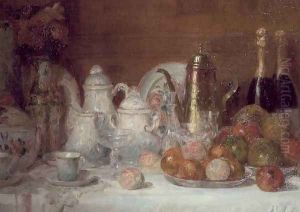Charles Couche Paintings
Charles Couche, also known as Charles Louis Couche, was a French engraver and cartographer born in 1746. He was renowned for his detailed and accurate cartographic works, which were important contributions to the geographical knowledge of his era. Couche's works often included maps and atlases that were used for both educational purposes and by the French military, reflecting the Enlightenment period's emphasis on exploration, navigation, and the classification of knowledge.
Couche's career spanned a significant period of French history, including the end of the ancien régime, the French Revolution, and the rise of Napoleon Bonaparte. Despite the tumultuous times, Couche managed to maintain a focus on his craft, producing works that would be referenced by scholars and explorers for years to come. His engravings and maps were known for their precision and beauty, a testimony to the skillful combination of art and science during the Enlightenment.
Unfortunately, little is known about Couche's personal life, and his work is often overshadowed by more famous contemporaries such as the geographer and cartographer Rigobert Bonne. What remains clear, however, is that Couche's dedication to his work left a valuable legacy in the field of cartography. He passed away in 1805, leaving behind a collection of maps and engravings that continue to be of interest to historians and collectors.
Though Couche may not be a household name, his contributions to the cartographic arts reflect the rich tradition of French engravers and cartographers who played a pivotal role in the advancement of geographical sciences. His works remain a testament to the meticulous and often unsung labor of mapmakers who have helped shape our understanding of the world's geography.
